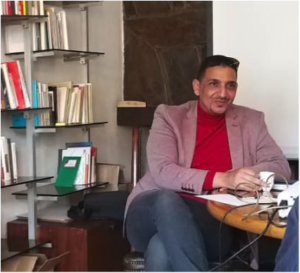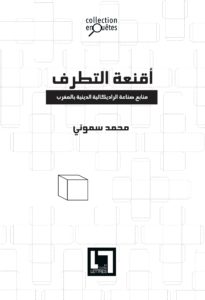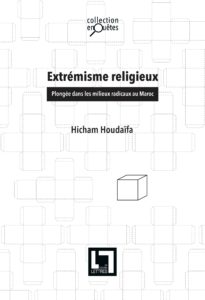Parcours d’un ancien prédicateur salafiste, Abdelwahab Rafiki
Parcours d’un ancien prédicateur salafiste / The Journey of a Former Salafist Preacher
Par / by Abdelwahab Rafiki
Abdelwahab Rafiki, alias Abou Hafs, livre un témoignage de son parcours personnel, depuis son enfance marquée par les engagements salafistes de son père et sa « carrière » de cheikh prédicateur, qui lui ont valu une condamnation à 30 ans de prison, jusqu’à son engagement actuel pour un islam des lumières et l’édification d’un État sécularisé.
Il analyse les mécanismes de l’embrigadement idéologique dont il a fait l’objet depuis son enfance, qui l’a amené, mineur, à suivre son père en Afghanistan en 1990.
Abou Hafs porte un regard critique sur les courants politiques qui traversent le wahhabisme, et les resitue dans leur contexte, depuis l’effondrement du bloc soviétique, en passant par les Guerres du Golfe.
Désormais, ses opinions sur des débats de société sont aux antipodes des idées salafistes. Il souhaite libérer la religion du joug de la politique et inversement, tout en encourageant la liberté de conscience, qu’il considère comme un droit humain également encouragé par l’islam.
Il remet en cause la base idéologique des mouvements terroristes et takfiristes comme Al Qaeda et Daech et évoque la nécessité de réviser le patrimoine religieux islamique pour opérer une révolution de l’intérieur même du texte religieux au risque de servir des intérêts extrémistes et violents.
*
Abdelwahab Rafiki—who uses the alias Abou Hafs—shares his personal journey, from a childhood marked by his father’s engagement with salafists ; to his “career” as a sheikh preacher, which earned him a 30-year prison sentence; to his current organizing and advocacy for an Islam of Enlightenment and a secular State.
He analyzes mechanisms used in ideological indoctrination, which he experienced starting early on in his childhood and which led him to follow his father to Afghanistan in 1990 when he was just a teenager.
Abou Hafs thinks critically about the political currents that run through Wahhabism and places them in contect, from the collapse of the Soviet bloc to the Gulf Wars.
Today, Rafiki’s opinions on social issues and politics are far removed from salafist ideology. He talks about liberating religion from the political and the other way around, all the while advocating for freedom of conscience, which he considers a human right that is not countered but encouraged by Islam.
Rafiki brings into question the basic ideology of terrorist and Takfirist movements like Al Qaeda and Daesh and highlights the need to reimagine the narrative and heritage of Islamic religious practice in order to create a revolution from within.
English translation by Anna Mitchell
Les avis des participants
« Une séance riche en informations concernant l’expérience personnelle de M. Abdelwahab Rafiki. »
« Une ambiance conviviale. »
« Une séance très intéressante et utile dans tous ses aspects, une bonne interaction avec les participants, un débat passionnant avec des conclusions convaincantes. »
Les points clefs
- Un témoignage fort
- Un parcours courageux
- Une grande capacité à extraire de son parcours personnel un décryptage des problématiques clef
« أبو حفص، مسار « شيخ نزع جلباب السلف ولبس أفكار التنوير »
 Abdelwahab Rafiki
Abdelwahab Rafiki
Abdelwahab Rafiki (Abou Hafs) est né en 1974 à Casablanca. Arrêté en 2003, il est condamné à 30 ans de prison. Il est libéré sur grâce royale en 2012. À travers ses interventions, ses conférences et ses articles de presse, il plaide aujourd’hui pour un islam des lumières et critique ouvertement les idées salafistes takfiristes.
*
Abdelwahab Rafiki (Abou Hafs) was born in 1974, in Casablanca. In 2003, he was arrested and sentenced to 30 years in prison. He was freed by a royal pardon in 2012. Through his events, lectures, and articles, he advocates for an Islam of Enlightenment and openly criticizes salafist Takfiri ideas.
English translation by Anna Mitchell
Pour aller plus loin

أقنعة التطرف، منابع صناعة الراديكالية الدينية بالمغرب | محمد سموني | فبراير2017 | 88 ص.
8 تحقيقات حول التطرف الديني.
8 enquêtes sur l’extrémisme religieux au Maroc. Prix spécial du jury du prix Grand Atlas 2017.

